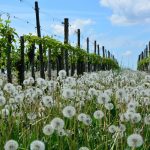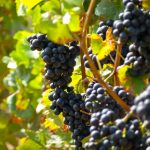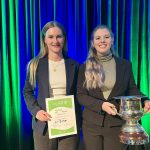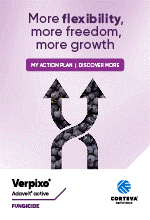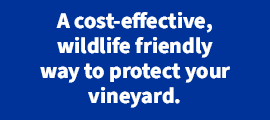Mercedes Paynter. Images supplied
By Meg Riley
Even in the midst of a hot and hectic vintage, Mercedes Paynter has more energy than most people. Now senior winemaker at Kilikanoon in the Clare Valley, Mercedes’ career has taken her from Washington to New Zealand, not just making wines but marketing them, importing and distributing them, studying them, and educating consumers on tasting courses. Her work has ranged from planting vineyards to pruning them, and Mercedes tells journalist Meg Riley she wouldn’t have it any other way.
“I kind of fell into winemaking, which is what we say back home,” said Mercedes. “I’m from Washington, in the US, and we always say that winemakers—you don’t go to school for winemaking, you fall into it.”
Mercedes did both. After an injury that left her unable to continue in her music career, she began pouring her energy into the job she was working to put her through university, which happened to be at a wine store in downtown Seattle.
The wine shop, The Chocolate Box, sold small-production, family-owned wines from Washington and Oregon, and through there Mercedes met an importer and distributor whom she ended up working for.
“That then fuelled my love of all things wine,” she explained. “Like all great love stories, I didn’t have a boyfriend in my late 20s, and my car died, and I was tired of working in an office job.
“I’m a very hands-on person that likes to do something different every day. And so I was like, you know what? Let’s travel. Let’s travel and make wine. And so, using all of the connections I had built, I started traveling in 2019 and making wine around the world.”
Before leaving the US, she spent seven years as a winemaker at a winery called Daven Lore in Washington, and it was this experience that she credits for having “got her into” the winemaking aspect of the job before travelling.
However, whilst in the US having a winemaking degree may not be paramount to working in the industry, Mercedes found it a barrier in her plans to be a travelling winemaker.
“I fell in love with it [winemaking], and then realised that nobody would take me seriously as I travelled the world,” she said.
“Back home, you can totally get off fine with not having a degree, as long as you understand the science behind it and what’s going on, and you make bloody good wine.”
“Whereas as I started traveling, everybody had degrees in winemaking. So I travelled and did my degree at UC Davis while I was traveling.”
Her travel plans were cut short along with everyone else’s in 2020, but not before she managed to get some overseas experience under her belt.
“I started off in New Zealand, making Sauvignon Blanc, and then I went to Portugal, and I worked for a winery that I [had] absolutely loved selling—a family winery called Quinta do Pinto, just north of Lisbon.”
“I worked there for three months, and that was hands down, probably one of my favourite harvests.
“I can’t really remember eating or sleeping, but the harvest itself was fantastic.”
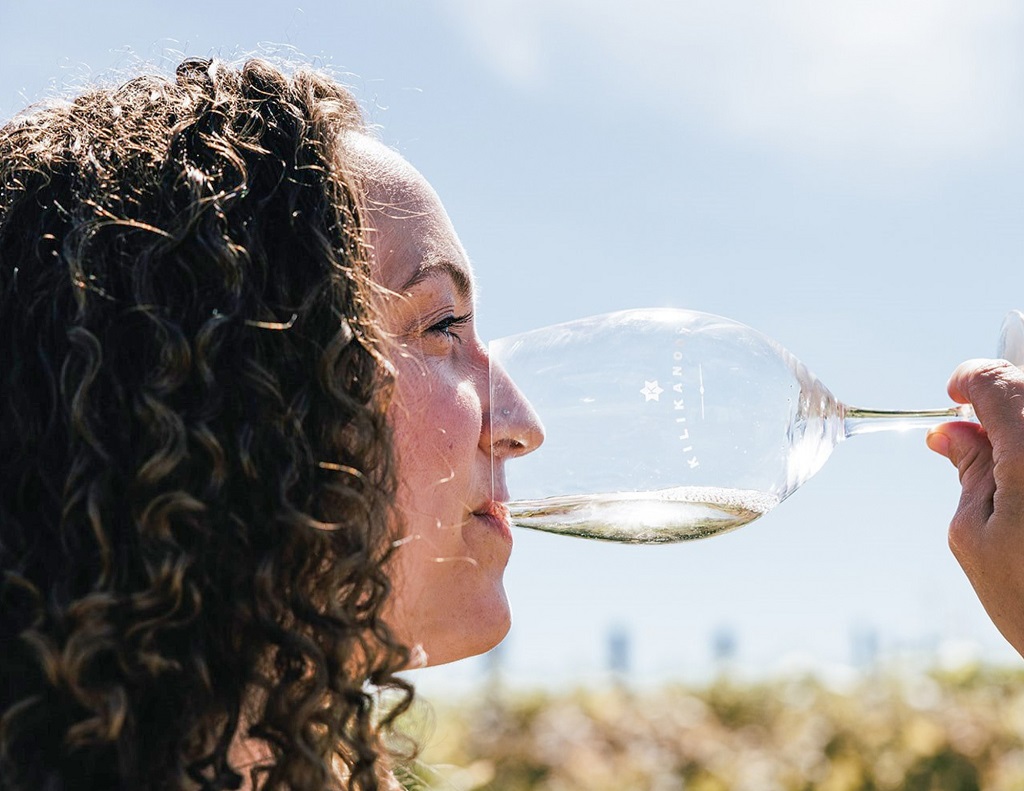
A whole New World
Mercedes found that when she came to Australia, the Australian Government wouldn’t recognise her degree.
Having realised she liked the country so much that she needed to figure out a way to stay, she opted to do a winemaking degree, again, this time at The University of Adelaide.
“Coming to Australia was a bit of a culture shock in many ways, but if you specifically talk about wine, you guys [Australians] have mastered that whole concept of New World wine in every single way possible,” said Mercedes.
“In the respect of fruit-forward wines, youthful wines…leaning towards that more lighter-bodied style…if you’re talking about US wines and the relationship to Australian wines, it’s what California develops as well.”
As highly as she spoke of Australian wines, Mercedes said she still longed for the wine styles in her home state.
“Washingtonians love Old World wines,” she explained. “We love that aged wine. We don’t mind those tertiary characteristics. A little bit of oak with that macerated fruit and the dark, broodiness. And doesn’t need to be all primary fruits up in your face—we can appreciate the development of a wine that’s been sitting in barrel for seven years.”
“And I suppose it also helps that most of the people coming into wine already had made their money elsewhere. So they didn’t need to right away make that cash cow.”
Mercedes explained that moving to Australia, this was one of the biggest recalibrations, adjusting to drinking wines that are only aged a year or two.
This difference was stark to Mercedes not just in what was expected of the winemaking, but also of the wine marketing in Australia.
“Looking at what people do want in the Australian market—it’s completely different from what we want back home. The mentality behind the buyer is different.”
Since working in the Clare Valley in South Australia, Mercedes said she has been very lucky with the wineries she has worked for, where she has been able to experience wines from youthful Rieslings through to long aged reds.
“The first company I worked for when I got here in 2020 was O’Leary Walker,” she said.
“I remember one of the first things I had here was a Riesling from ‘96 of O’Leary Walker, and I was stunned. By, just the youthfulness that presented itself in that bottle.
Upon sampling the reds, Mercedes was amazed at how well they were holding up.
“[I had to] remember that everything is under Stelvin here, not cork, so that really helps with that,” she laughed.
Now she is working for Kilikanoon, where Mercedes explained their whole concept revolves around releasing the best wine they can, when it’s ready.
Like any other business, the winery does go with market demand, but Mercedes noted that the variation in their range allows them to hold back a wine that isn’t ready yet, and wait for the “sweet spot”.
“I’ve gotten very lucky to be able to work in something that makes sense to me, but then also at the same time, work in a place where I can do the Australian thing as well, like our Prodigal, which won the trophy in Adelaide for Grenache two years back.”
“That more fruit-forward style, that one-year-old, six months in oak kind of thing, which is one of my favourite wines to make, I think it’s beautiful.”
“The one thing I will always say, is that I’ve never met a variety I don’t like, I just didn’t like what the winemaker did to it,” she said.
“A lot of people don’t realise that winemakers have so much influence.”
Working in sales, Mercedes said this was one of her favourite parts of the job – helping customers to overcome their previous experiences or assumptions about varieties and styles they thought they didn’t like.
“Showing them that can be really cool: Pinot Noir can be very light, but it also can be super rich and extremely alcoholic, depending on where it comes from, and very full. Grenache can be the same way. It’s amazing.”
Despite having her own favourites in wine styles from back home, Mercedes said she loves all wines – “there’s too much wine in the world to discriminate”, she laughed.
“I love it–[from] big bolds, dripping tannins to the lightest, most delicate austere styles.”
The region she works in now is known well for its Riesling and Shiraz and Cabernet, but lately, Mercedes has also been especially taken with Grenache.
“Kilikanoon has some of the oldest plots of Grenache,” she explained. “It’s stunning to work with – and there is not just one single plot, but multiple plots, from the 1800s to the early 1900s – old bush vines and things like that.”
Of the reds, she said she was particularly fond of working with Grenache because of its range of expression.
“…Seeing the differences that we can make within that Grenache style, from that light-bodied, pretty, six months only-in-oak [style], to that really heavy, more classic Australiana Grenache,” she said, was especially satisfying from a winemaking viewpoint.
When it comes to producing whites in the Clare Valley, Mercedes admitted she had a clear favourite.
“It’s got to be Riesling, right? I think the versatility of Riesling is really fun. Pete and myself, the other winemaker, we enjoy trying to push the bounds of Riesling – looking at how textural it can be versus how lean we can make it.
“One of our other favourite things is trying to do that Germanic style, really trying to champion that off-dry, early-pick, lower-alcohol Riesling.”
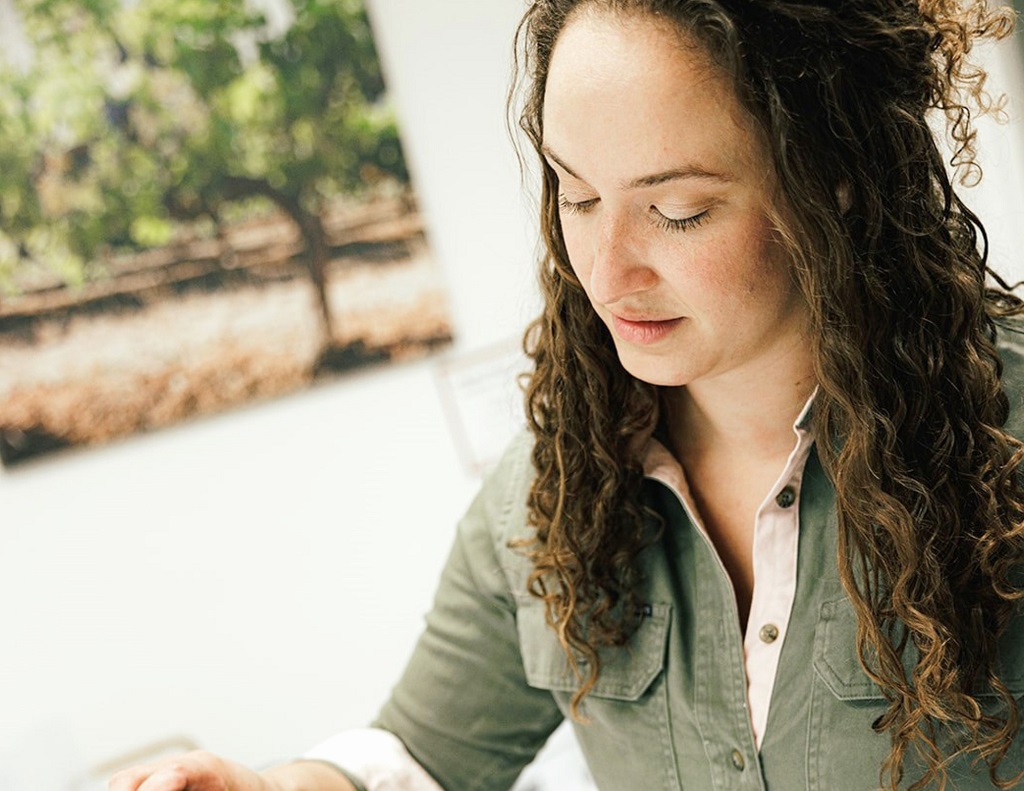
Picking a trend
With alternative varieties taking off around the world, touted by many as the way of the future, Mercedes was considered about what it is that shapes these trends.
“Everywhere in the world is such its own little universe within wine,” she said.
As a winemaker in Australia, she considered what Australia’s wines look like on a global scale – “What do people expect Australian wine to be?” she asked. “I think people have a preconceived notion of what Australian wine is…”
Of course, Mercedes acknowledged, Australia is limited by how much it costs, not only to produce wine in Australia but then to transport it elsewhere, although as she pointed out, this transport problem also applies to wineries from the US and EU trying to ship their wine to Australia, or to other markets.
“One thing I’ve always enjoyed about Europe is that they suck at change, for the most part,” she said. “They’ve solidified what works for them, and it’s a beautiful thing, but it also can be possibly to their detriment.”
For example, she noted Bordeaux’s recent move to add new varieties to its appellation in response to climate change.
Looking forward at the future of an industry so led by the consumer and based on luxury, Mercedes acknowledged that the trends will always be reliant on what people want.
“So far, what we are seeing is people wanting easier drinking – something delicious in the glass. They don’t need to get absolutely smashed from the one glass they are having; they want to enjoy that glass from start to finish.
“And they can enjoy those delicate flavours just as much as [when], 40 years ago, people were enjoying that extremely high-alcohol, jammy Shiraz.”
Again, Mercedes noted that this perspective was formed from the time and place that she is living in.
“I feel like if I was back home, I might say something entirely different,” she added.
In order to test the consumer demand for new varieties and winemaking styles, Mercedes has an outlet for more experimental wines in the form of Kilikinoon’s KX range. Launched around four years ago, this label is separate from the winery’s core range, and provides an avenue for small batches of alternative varieties, or wines made using different fermentation methods or vessels, to see how they perform on the market.
“Based on those trends, we can then adjust the core range as needed,” Mercedes explained.
“We jumped on the whole bunch train for a while – looking at Grenache and the whole bunch scene, playing with how much whole bunch do we need, how long does it need in oak? That proved to be something that the consumer absolutely loved.”
These small-batch tests are usually around 1,000 litres.
“Our first Cab Franc that we did was one barrel, so micro testing, but it’s something fun, it’s something different for us to be able to experiment with.”

The wholistic approach
For Mercedes, her love of winemaking is built through a passion for the entire industry. From her start in sales, she has worked in importing, distributing, creating tasting notes and marketing materials, led classes in how to taste wines, completed her WSET level 3 and helped to plant vineyards.
“I have done pretty much everything with regards to winemaking or the wine business, I suppose you could say.”
During her time as a travelling winemaker, Mercedes had to make money somehow in between vintages.
“In that interim…I prune,” she said. “I love pruning. My body doesn’t like it, but I love it.”
Understanding every step that leads up to the winemaking process is equally important to the process itself, and Mercedes said she tries to be enthusiastically involved in as many areas of the winery and vineyard as possible.
“I think in order to really understand what’s happening in the winery, [if you’re] going to be a winemaker or going to be in this business, you should try and make yourself invaluable by learning every aspect. I don’t just want to be that deaf winemaker…I love being involved in everything.”
More than just a hands-on attitude, Mercedes said this passion to be involved is an attitude she chose, and one she has seen pay off.
“The lesson I’ve learned is [to be] always putting yourself out there and meeting and talking to as many people and hearing everybody’s story. Because sometimes, being a winemaker, you get so focused on the wine, right? The grapes come in, you crush them, you ferment them…And sometimes you just get so focused on this, the winery aspect, that you forget the greater picture.”

A universal language
Mercedes said that she found the industry to be very much about ‘who you know’ (“like most things in life”), but added that she has managed to get to where she is now by creating those connections herself (and, she said, by talking a lot).
This passion is something she has found to be contagious in other people throughout her career. One female winemaker at Cote Bonneville who Mercedes spoke with when she was working in sales left a lasting impression.
“I remember the day she came in and talked to me about oak grain in a barrel. I spent an hour and a half learning, because at this point I didn’t know anything about oak grain in barrels…[for] an hour and a half, I was listening to her just talk about the grain and how that changed the wine. That science-y nerdiness made me fall in love with this industry.”
Always eager to learn more, Mercedes encouraged newcomers to the industry to foster their thirst for knowledge. Her advice to any young aspiring winemakers at the outset of their careers, was to never be afraid to ask the question.
“It’s generally when you think the question is dumb that you don’t ask it, and then that’s a missed opportunity,” she said.
“…If you’re not interested, if you don’t have that intrigue, then you’re missing so many things along the way that could be the one key thing to elevate you in your future.”
Working hard, applying herself and shirking any boxes, Mercedes said her goal is to produce work that speaks for itself.
“As a personal thing, I try to make my career – and this was even before I was in winemaking – not about my gender or about my age, but about what I do.”
Looking back at her first career in music, and now to her current work in winemaking, Mercedes can see a clear thread connecting the two.
“The entire reason I got into music was because it’s a universal language. Regardless of if I could actually speak that language or not, people would understand what I was about because of that. When life took a slight detour and I got into winemaking, I realised that that is also another universal language.”
Looking forward, there were some areas of the sector that she wishes she could change. In an ideal world, Mercedes said she wished that the industry would only produce wine based on demand.
“You’d be saving water, you’d be reducing emissions, running tractors and things like that. So I think that if we could really, as an industry, take stock of where we’re at, what we’ve done, and make a change for the better in that way, that would be amazing.”
This article was originally published in the April 2025 issue of the Australian & New Zealand Grapegrower & Winemaker. To find out more about our monthly magazine, or to subscribe, click here!
Are you a Daily Wine News subscriber? If not, click here to join our mailing list. It’s free!


